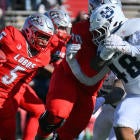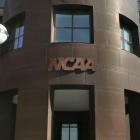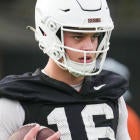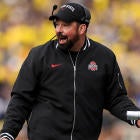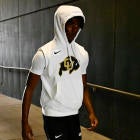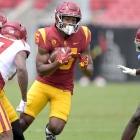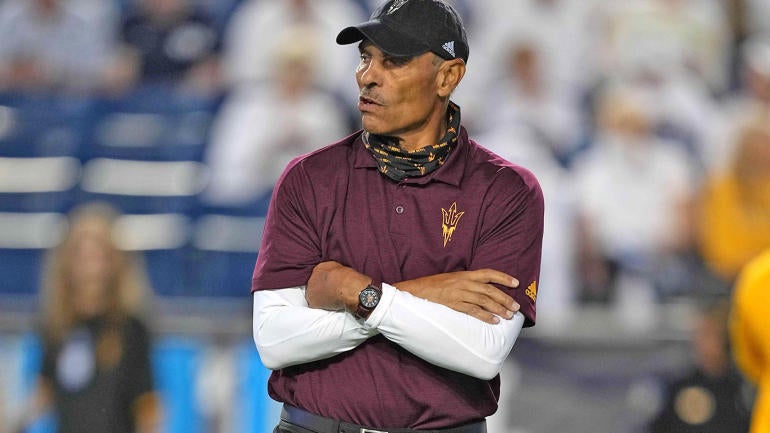
TEMPE, Ariz. -- Herm Edwards has never been one to sidestep a microphone. When he joined Arizona State 4 ½ years ago, Edwards spoke of a "lifetime contract" at ESPN if he ever chose to return as an NFL analyst.
That should be comforting these days for the Sun Devils' 67-year-old coach.
A unique 2018 arrival in the desert has evolved into an uncertain future. Tuesday, in the Arizona State coach's first remarks at a formal press conference setting since the end of last season, Edwards talked a lot but didn't say much.
Much of what folks wanted to hear about was one of the biggest stories of the offseason: Arizona State remaining under investigation for allegedly committing major recruiting violations that are beyond the pale, if true. Recruits were reportedly brought in during the COVID-19 dead period violating not only NCAA rules but medical common sense and ethics.
"I don't listen to the noise, and this is about spring football," Edwards said Tuesday. "That other stuff, I won't comment on it. That's the way it is."
Both Edwards and the school are lawyered up. It is becoming clear -- barring any other developments -- that Edwards will return for a fifth season. He is 25-18 across the previous four. Again, that's less of a point compared to the alleged liberties taken by the staff.
Five of Edwards' now-former assistants have departed Arizona State or been fired. For better or worse, the school is clearly circling the wagons around its head coach.
The Sun Devils are nowhere close to receiving a notice of allegations from the NCAA, sources tell CBS Sports.
That fits the profile of the only other school to have allegedly committed the same violations during COVID-19. Tennessee is also far from getting its notice, according to sources. Considering other NCAA cases in the pipeline, indications are the earliest the ASU case could be resolved is Spring 2023.
Will another season with Edwards be worth it?
It will be up to the NCAA whether Edwards is directly implicated. A photo of Edwards meeting a top-100 recruit in the ASU weight room during the COVID-19 dead period reportedly exists. A 247Sports report in February stated Edwards met with recruits during that dead period in a rented house located in the tony Phoenix suburb of Paradise Valley.
Asked Tuesday to self-scout himself after four seasons, Edwards said, "I don't self-scout myself. That's not my job. … I know one thing, I enjoy coaching my players."
For purposes of a national overview, it's not really about the ASU roster or the prospects for spring practice. It's about Edwards and the program moving forward.
The most obvious question came from a radio host a couple of weeks ago to Arizona State president Michael Crow: Why is Edwards still the head coach?
Crow seemed to answer by blaming the alleged violations on the five departed assistants. The widespread recruiting violations laid out in a reported "dossier" were their fault, Crow intimated.
"These are not things [Edwards] was a part of," Crow said.
The lawyers for those five coaches might be interested in that comment as Crow seemed to lay the blame on them.
Sticking with Edwards could send Arizona State down the same slippery slope LSU just took with basketball coach Will Wade. The Tigers are awaiting major penalties after the decision was made to stay with Wade after suspending him three years ago in the wake of the FBI investigation into college basketball.
It's probably not fair to compare the affable, classy Edwards with Wade and his "strong-ass offer". It's more about similar approaches by the schools in the aftermath of alleged violations. Then again, in these cases, there has always been a discrepancy between what is alleged and what the NCAA can prove.
Edwards may just retire after the season, possibly mitigating sanctions.
On the flip side, everyone knew during COVID-19 that recruits weren't allowed on campus. Everyone. The 14 1/2-month dead period set a record.
If ASU hosted recruits during that time, it was both an NCAA and ethical breach. During the height of the pandemic, recruits were allegedly being brought in from around the country when the coronavirus was spreading.
If the coach didn't know that was a violation, he should have. There is a little thing called the head coach responsibility bylaw the NCAA could trot out to nail ASU.
"Either this is going to be a wild success, the selection of this coach, or it's going to fail miserably," executive senior associate athletic director Jean Boyd told CBS Sports shortly after Edwards was hired.
It's fair to say the NFL model instituted by athletic director Ray Anderson, Edwards' former agent, has worn thin.
It perhaps symbolizes why these allegations arose in the first place: lack of attention to detail. There has been so much of an emphasis on the professional model that details of the collegiate model may have been forgotten.
The program has gotten worse in average penalties per game each season to the point that only four were worse than ASU in 2021 (126th nationally).
Perhaps Arizona State would be wise to self-impose a bowl ban now to begin the healing process. It would be wise given the Sun Devils aren't expected to be that good in 2022. The incoming recruiting class was rated last in the Pac-12 by 247Sports. The 2023 class isn't yet registered by 247Sports in its Pac-12 rankings. There are projected to be 25 new players on the roster.
Perhaps such a move would be wise given the pressure has begun to mount on the program. Former running back Rachaad White told a local radio station that the ongoing investigation was a distraction in 2021.
"We tried to do our best to block it out," White said. "At the end of the day, [it was] just tough because distraction is what … kills things kinda, what messes up things. I feel like that was one of the biggest things that I felt like messed up our last season, is kind of being distracted by it and not being able to zone it out."
The NCAA will ultimately have the largest role to play in the immediate future of ASU football. The association began interviewing former players as early as last August. At stake is a program that historically has spun its wheels in the desert dust.
Quarterback Jayden Daniels (now at LSU) was among those transferring out after pledging his intention to stay. Daniels is coming off his most accurate passing season to do battle in the SEC.
"We thank him for all he's done here. He helped us win a lot of football games," Edwards said. "I wish him much success. Now, I've got five other quarterbacks to figure out who we have."
Among those other signal callers is Alabama transfer Paul Tyson, the great grandson of Bear Bryant. That might be the best link between ASU and Bama's excellence given Edwards' original coordinators are long gone to Florida (head coach Billy Napier) and North Texas (defensive boss Phil Bennett). New offensive coordinator Glenn Thomas has NFL experience, but while in the same position at UNLV the last two years, the Rebels went 2-16.
One observer at Monday's pro day pointed out Arizona State had more NFL coaching talent on the field than the teams actually coming to scout. Edwards, Brian Billick and Marvin Lewis have been NFL head coaches. Defensive coordinator Donnie Henderson was Edwards' coordinator with the New York Jets.
This has been a place that always begged the big "Why?" Why can't there be 85 willing, talented scholarship players who want to be in a big city in this climate on a lovely campus playing in a Power Five conference?
"You got so many schools now that they want all these players," Edwards said. "You've got to nationally recruit. We've tried to do that."















